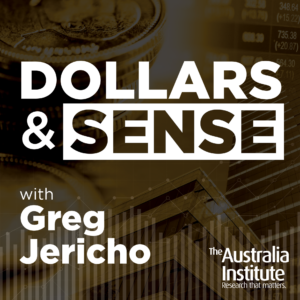by Richard Denniss
[Originally published in the Australian Financial Review, 02 September 2019]
Neoliberalism has made Australia more fragile, fractious and open to foreign influence. We talk a lot about the rise of Chinese influence but there’s less discussion about the decline in our national self-confidence. Despite living in the world’s 14th largest economy with some of the lowest taxes in the developed world, neoliberalism has allowed successive governments to make us feel poor. Our misplaced sense of poverty leads us to make poor decisions.
It was our decision to make Australia’s best universities dependent on foreign students for a fifth of their revenue, to privatise our essential infrastructure, and to cut foreign aid spending on our nearest neighbours. These decisions have weakened our control over our society and weakened Australia’s influence in the Asia Pacific, opening the door for other countries, such as China, to fill the void.
All countries influence other countries, overtly and covertly, in pursuit of “the national interest”. Australia bugged the East Timorese Cabinet room to get a better deal on gas. We tried to listen in on the phones of the then Indonesian president and first lady, and we bugged the former Chinese embassy so comprehensively that in building a new one, Beijing used an entirely Chinese workforce.
Australia isn’t alone in this game. President Barack Obama apologised to German Chancellor Angela Merkel for the bugging of her phone by the National Security Agency, and Airbus accused the US and Germany of spying on it.
The purpose of national security policy, and of counter-espionage organisations such as ASIO, isn’t to prevent spying but to mitigate it, monitor it and, if done well, disrupt it with disinformation.
Countries can’t completely prevent foreign influence – Germany, Indonesia and East Timor couldn’t stop others listening in, and the US couldn’t prevent WikiLeaks from letting US secrets out – but they can minimise it if they try.
However, for the past 30 years Australia has put the imagined threats of budget emergencies and the ideological pursuit of a surplus ahead of very real threats to Australia’s national security. Whoops.
Australia’s decision to lease Darwin Port to a Chinese conglomerate for 99 years enraged the military establishment in Canberra and Washington. And although the federal government monitors journalists and NGOs, the Abbott Cabinet had no idea who had bought Darwin Port until hours before it was publicly announced. The Foreign Investment Review Board knew and the Australian Competition and Consumer Commission knew, but the Abbott Cabinet and the national security community did not.
There was no pressing financial need to sell Darwin Port. Like our taxes, public debt in Australia is very low, but such was the enthusiasm for privatisation that, at the time, FIRB had no oversight of state government asset sales.
There was also no pressing need to make Australia’s universities rely so heavily on fees paid by foreign students. The first rounds of neoliberalism saw Australian students paying higher and higher fees to go to university. Despite all the extra funding from domestic students, our universities are still desperate for cash. Where there is desperation and greed, espionage thrives.
But it’s not just domestic policy that has fallen under the spell of neoliberalism. Over decades Australia has replaced foreign policy with trade policy. Historically there was little overlap between our perception of Australia’s national interest and our export statistics. The amalgamation of the Department of Foreign Affairs and the Department of Trade into DFAT, back in 1987, was radical at the time but quickly became taken for granted. Likewise Tony Abbott’s decision to absorb AusAID into DFAT. But look at the results.
Recent criticisms from the Pacific of Australia’s plans to build new coal mines make clear that trade interests and foreign policy interests don’t always line up. Is it more important for Australia to sell coal to India or to have strong Pacific relationships and blunt Chinese expansionism? Were Abbott’s cuts to the aid budget a good way to reduce the budget deficit, or a bad way to manage diplomatic relationships?
It’s time for Australia to reconsider the ways it protects itself from foreign influence and projects influence outwards. Scott Morrison’s “Pacific Pivot’ was never about trade, yet our policy towards coal and climate revolves entirely around trade. Australia isn’t broke, it is rich beyond the imaginings of previous generations. And while some financial flows strengthen our economy, others weaken our security and state. For too long we have relied on ideology when making such judgment calls.
Richard Denniss is chief economist at The Australia Institute.
Between the Lines Newsletter
The biggest stories and the best analysis from the team at the Australia Institute, delivered to your inbox every fortnight.
You might also like
The housing crisis is turning into an inequality crisis
The rising concentration of property and investment assets in the hands of wealthier Australians is making housing crisis worse and deepening economic divides.
This inequality isn’t inevitable
By offering generous tax concessions to property investors and making it nearly impossible to live on JobSeeker, Australian governments have being making inequality worse.
Bad advice – which hasn’t aged well
Ten years after former Treasurer Joe Hockey advised Australians to get “a good job that pays good money” to buy a house, new analysis by The Australia Institute reveals just how bad that advice actually was.



